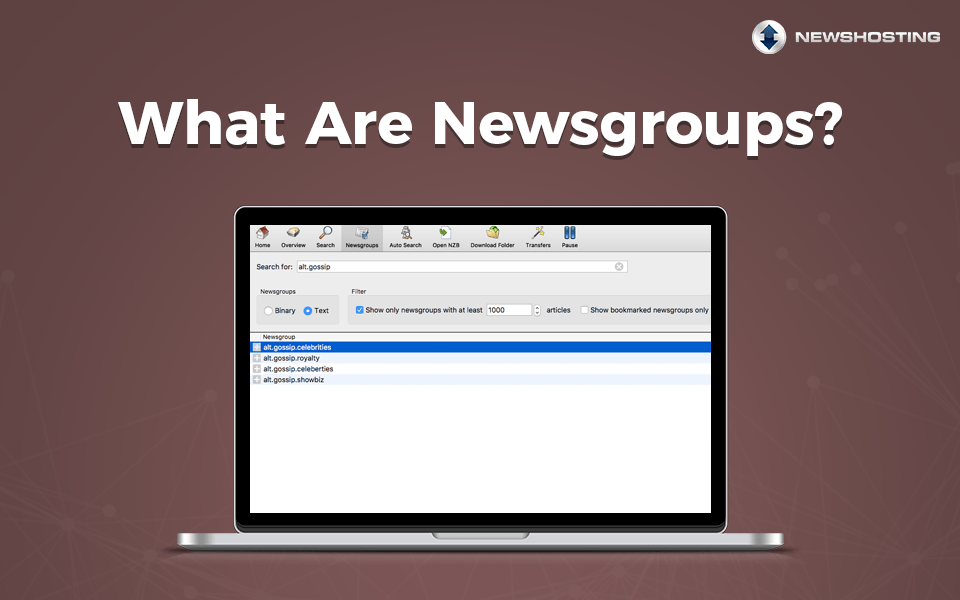
The arrest of Ross Ulbricht revealed just how little we remember about the evolution of the internet. Ross Ulbricht, commonly known as The Dread Pirate Roberts, was the man behind the Silk Road. This site was part of “the Deep Web.” Sites on the Deep Web were not searchable using common web browsers. People were shocked to find out that the World Wide Web was not synonymous with the internet. News outlets started to discuss the Deep Web, and the common thread in most of the reporting was that the Deep Web was new.
This sort of reporting is indicative of popular misperceptions about the internet and the World Wide Web. In reality, there have always been networks and information spaces outside of the World Wide Web. For many of us, we have always known about places like Usenet. More importantly, we have always understood the importance of places like Usenet. As the shortcomings of the World Wide Web have become increasingly clear, Usenet may offer a way forward for others who value security and community on the internet.
What Exactly is the Internet?

The internet is based on a common protocol for sharing data. That is it. When it comes down to it, the internet is really just a series of tubes. News articles, games, shopping, etc are all just code being shared across vast distances. The key is that the TCP/IP protocol, developed in the 1970’s, allowed for the rapid sharing of information via packet switching between different users. More importantly, it allowed for packet switching between different networks of varying design. This is what is commonly called an open-architecture network. Hence, the term “internet.” While the World Wide Web is clearly the most popular way of finding users and information over the internet, it is just one way of doing so.
The way we use the internet has changed over time. Famously, the precursor to the internet, ARPANET, was designed by DARPA in the 1960’s as part of a project to ensure secure military communication. By the 1970’s, scholars and researchers began to use the internet as a way to share data. It was not until the 1990’s that the World Wide Web really achieved dominance. Before that, the internet was composed of a number of different networks. Usenet started out as one such network. However, unlike previous networks, Usenet was eventually targeted to a broad audience. The application quickly spread and became a cultural phenomenon. As such, many of the terms we now associate with the web, specifically “flame wars” and “spam”, started on Usenet.
The Spread of the World Wide Web

The World Wide Web largely supplanted other information exchange mediums because of its accessibility. The Uniform Resource Identifier (URL), in conjunction with the registration and regulation of domains and IP addresses by ICANN, was key. People around the world could use a browser to search the same information space. Unlike Usenet or smaller purpose built networks, the World Wide Web could be easily scaled up. However, the World Wide Web did not order information. It only provided a convenient way of searching for data. In this way, the World Wide Web is not a single community, but a collection of them.
The popularity of the internet means it is turning an increasingly regulated and segmented space. As the internet became a part of everyday life, governments wanted to regulate and survey a borderless space for exchanging information and impose their own borders and regulations on it. Corporations also wanted to assert control. Thus, the internet operates differently across the globe. At the starkest end of the spectrum, users outside of the West have to worry about extreme censorship and monitoring by state authorities. But even Western users have to increasingly worry about the implementation of draconian laws and loss of anonymity.
Additionally, trolls representing various ideologies have made discussion on the internet toxic and small-minded. Flame wars may have started on Usenet, but they have reached their ultimate form on the World Wide Web. The World Wide Web not only reflects the thoughts and desires of its users, it indulges them. Usenet could have gone down a similar road.
The World Wide Web Versus Usenet

Usenet could have been the World Wide Web. Naysayers criticize the way Usenet’s posts are organized, claiming it is difficult to find what you’re looking for across different newsgroups. But, with the advent of indexing sites and integrated search, this is somewhat of a moot point. Plus, there is nothing about Usenet that innately prevents information from being organized exactly as it is on the World Wide Web. Usenet could have developed a centralized location system like the URL. It could have adopted a domain registration system through an ICANN-like body. This would have made Usenet much easier to commercialize. But Usenet did not centralize.
That does not make Usenet obsolete. Quite the opposite. Had Usenet followed the same path as the World Wide Web, we would have two nearly identical methods for the exchange of information over the internet. This means we would have lost what makes Usenet unique. If anything, Usenet’s lack of centralization makes it a valuable and necessary complement to the World Wide Web.
Usenet and the Future

Usenet is akin to a wide scale, Deep Web version of a forum or social media community. It allows users to share a variety of posts, and different newsgroups function much like subsections of a forum or different pages on Facebook. Decades before Facebook, Usenet allowed its users to instantly share ideas. Unlike Facebook, Usenet allows for anonymity and community control. Facebook, Twitter, and other web applications often find it difficult to manage a community of users. Usenet offers one way of dealing with these problems. Usenet, by providing such anonymity and community control, has sustained an active community over thirty years.
In the future, web applications could and probably should look more like Usenet. Anonymity and privacy are becoming precious commodities on the internet. Government surveillance, corporate data mining, and personal harassment have made the web an increasingly frightening place. The problem for web applications is how to balance accessibility, privacy, and security. We may already have the answer in Usenet.






